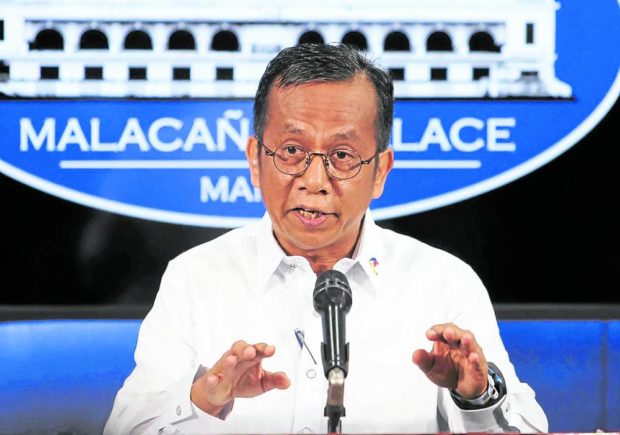One of President Marcos’ economic managers called on lawmakers to agree on a common position on Charter change (Cha-cha) as its uncertainty may dampen local and foreign investments here.
Socioeconomic Planning Secretary Arsenio Balisacan made the appeal on Friday at a press briefing in Malacañang amid the widening conflict between the two chambers of Congress over Cha-cha.
“I hope they can agree very soon. Because we don’t want that uncertainty. One of the factors that inhibit investments, whether domestic or foreign, is a state of uncertainty,” Balisacan said.
READ: Senate, House clash over people’s initiative for Charter change
He was asked to comment on the disagreement between senators and district representatives on the mode of changing the 1987 Constitution.
“We hope that our leaders will come to a common position quickly so that we can move on,” Balisacan said.
He supports “eliminating unnecessary restrictions” in the Constitution” to make the country more competitive in attracting foreign capital.
“Apart from eliminating those restrictions, we need to also do a lot of other things. That’s not the only problem that we face as a nation when it comes to economic development. We need to address the ease of business issues that are always mentioned, the high cost of certain inputs like energy and the predictability of our policies, regulatory or otherwise,” Balisacan said.
“So, there are things that we need to do at the same time so that we can get the full benefits of removing those economic restrictions in the Constitution.”
READ: Speaker denies senator’s claim: ‘Nagma-marites siguro’
Balisacan, head of the National Economic and Development Authority (Neda), shared the President’s position against allowing foreigners to fully own land.
He cited the country’s failure to develop into a regional hub for higher education.
“I think we missed a major opportunity to have the country as a base for higher education in many countries that have looked for branch campuses outside of their countries. I’m talking about the United Kingdom, Europe, United States and Australia, looking for campuses in Asia and Southeast Asia,” he said.
Missed opportunity
Balisacan said these foreign universities had gone to the Philippines’ neighbors like Malaysia, Singapore, Thailand and Vietnam to establish branch campuses.
The Philippines would have been the “best candidate” for foreign universities because its educational system is “very close” to the United States and other Western countries, Filipinos have “the language,” a reference to the wide use of English.
“But we missed it because we won’t allow ownership of foreigners in the area of education. The same is true in the practice of the profession, extremely difficult to employ professors coming from other countries if those professors are bringing in the skills that we lack,” Balisacan said.
He said top Philippine universities have difficulty getting foreign professors to teach here because of supposed restrictions to practice and teach here.
The Cha-cha movement has received the support of the Union of Local Authorities of the Philippines (Ulap), the umbrella organization of all leagues of local government units (LGUs) in the country.
In a statement this week, Ulap said it recently adopted a resolution that cited the need for a “more responsive, accountable and updated governmental frameworks” to allow LGUs “to fully harness their potential in fostering local development and contributing to national progress.”
According to Ulap, amending the Constitution will address present problems, “particularly on issues brought about by the evolving economic landscape, rapid technological advancements and heightened global interconnectedness” after the approval of the 1987 Constitution.
On Tuesday, President Marcos said he was open to amending the economic provisions of the 1987 Constitution and was also open to “political amendments” such as the lifting of term limits for officials.
Proponents of the people’s initiative mode for Cha-cha said at least 2.5 million voters have signed their petition as of Jan. 24.
A lawyer based in Bacolod city announced early this week that he would lead a campaign to help people who did not fully understand what they signed to withdraw their signatures.
Investigate campaign
“This is my own initiative and no one is behind me,” said Cesar Beloria.
Commission on Elections (Comelec) Chair George Garcia last week said people who had signed a petition for a people’s initiative could still withdraw their signatures if they did not fully understand the significance of the planned Charter change.
Beloria said some people claimed to have signed the petition because they were made to believe that it was for the continuation of government programs for financial assistance while others did so because their parents were barangay workers.
He challenged the Department of the Interior and Local Government to investigate reports that the signature campaign was spearheaded by barangay officials.
Provincial Elections Supervisor Ian Lee Ananoria said the signatures in support of the people’s initiative submitted to the Negros Occidental Comelec increased to 211,741 on Jan. 22.
Bacolod Mayor Alfredo Abelardo Benitez said he was surprised that the signatures from his city reached 69,098.“That means the general public is saying it is about time we do something that is different. I do not believe the people will sign without understanding what they signed,” he said. —WITH REPORTS FROM NESTOR CORRALES, CARLA GOMEZ AND INQUIRER RESEARCH INQ
